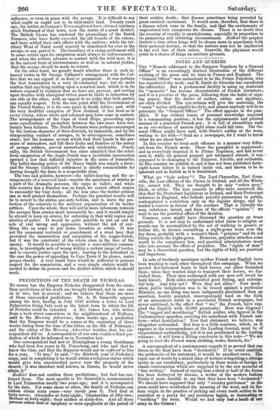PREDICTIONS OF THE DEATH OF NICHOLAS. No sooner has the
Emperor Nicholas disappeared from the scene, than predictions of his death are brought forward, not in one case or in two, but in several; and we believe that there are more of these unrecorded predictions. Dr. A. B. Granville appears among the first, having in July 1853 written a letter to Lord Palmerston fixing July next as the latest term to which the life of Nicholas could be extended. A Mr. James Lee, who writes from a back street somewhere in the neighbourhood of Holborn, seta to the Morning Advertiser, three weeks ago, a prediction that the Emperor would be a corpse at the expiration of three weeks dating from the time of his letter, on the 6th of February; and the editor of the Morning Advertiser testifies that his cor- respondent did so. A correspondent of our own recalls a third pre- diction of which he informed us in November last. Our correspondent had met at Birmingham a young Scotchman who had been five years in St. Petersburg, and who said that he knew the Czar, and that the Emperor would not be suffered to live for a year. "It was," he said, " the thirtieth year of Nicholas's reign, and in completing it he would attain a religious status which would give him uncontrolled power over the property of the &web : it Was therefore well known, in Russia, he would never attain it." Zadkiel does not confirm these predictions; but fact has con- firmed them. The most specific is Dr. Granville's, communicated to lord Palmerston-nearly two years ago; and it is accompanied by the data. For some cause or other, the family of Nicholas can seldom attain sixty years—very rarely pass it. Paul died at forty-seven; Alexander at forty-eight; Constantine at fifty-two; Michael at forty-eight; their mother at sixty-five. And all these persons either died of apoplexy or were apopleotio at the period of their sudden death; that disease sometimes being preceded by great cerebral excitement. It would seem, therefore, that there is a disease which runs in the family, and that the excitements of ungoverned rule exasperate the disease. There is no doubt that 'the exercise of royalty is unwholesome, especially in proportion to its pampering and irritating circumstances. Zadkiel the prophet foretels a time when kings will be chosen more in accordance with their personal destiny, so that the nations may not be implicated in the evil fate of their rulers. Granville the physician would point to a choice of kings on sanitary grounds.


























 Previous page
Previous page